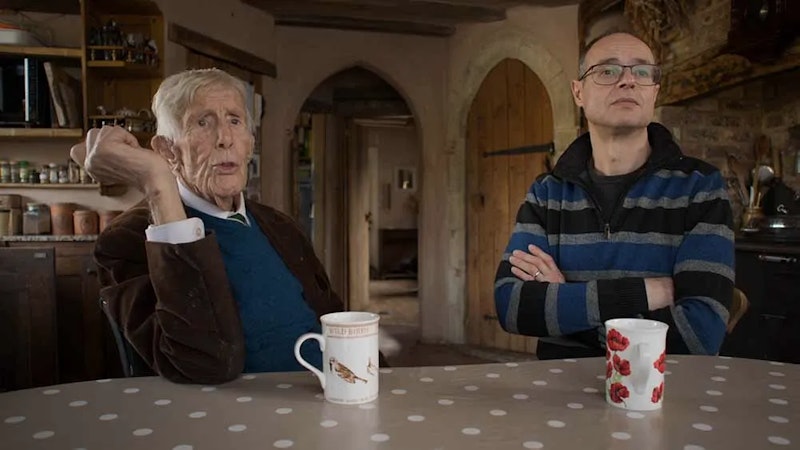How far would a patient go to have perfect teeth? Put another way, how far would an orthodontist go to give his patients a perfect set of teeth? A new Netflix documentary, Open Wide, explores the work and turmoil of John Mew, considered a controversial orthodontist, and his son, Mike Mew, who has followed in his father’s footsteps.
John Mew, now in his 90s, is famous for upending mainstream orthodontics in the UK. He advocated against already accepted orthodontist practices, and developed his own version, which he called orthotropics. It wasn’t enough to simply straighten a patient’s teeth, which might become crooked later in life anyway. For Mew, what was more important was to facilitate the growth of the face and jaw to not only make sure the teeth aren’t crooked but that the face isn’t growing disproportionately, creating saggy and droopy appearance.
This may be a valid concern but Mew’s techniques and “appliances” were called into question. The idea is to widen the upper jaw through the use of palatal expanders. In addition, the patient was asked to change his or her diet. These contraptions were incredibly painful since the child had to be trained to change the position of his or her mouth and tongue. In effect, this was done through a “Pavlovian response”: every time a child stopped doing the necessary “exercises,” like a shock, he or she would feel the pain through the palate expander. The process would last four years.
Naturally, such practices were called into question by British Orthodontic Society, and Mew was accused of child abuse. All of his patients did submit willingly, or at the very least, the parents did. It would appear that John Mew did everything out of authentic care (and not because of some hidden sadistic feelings) but was that wise?
Directed by Sara Goldblatt, Open Wide doesn’t explore the practice of orthotropics. Rather, she focuses on John and Mike Mew, their relationship as a father and son, and father’s legacy that Mike Mew (who also became an orthodontist) is trying preserve. Goldblatt commented on the aesthetic choices she made when making the documentary: “What’s in a face? The answer I learned from John and Mike Mew is: so much more than you think. I was drawn to the two men because of the controversy surrounding their unorthodox beliefs, and discovered a story about family and legacy and why we care about the things we care about. It’s a real rabbit hole, and I hope people will enjoy going down it as much as I did.”
Goldblatt’s an excellent guide. She eschews the usual and boring “true crime” approach (that seems to be the only way documentaries are made lately), and instead opts to tell a story about this quirky and odd family of orthodontists.
There’s a trace of Werner Herzog’s aesthetics in Goldblatt’s approach: she lets her subjects (main or secondary) speak for themselves. They’re fully in possession of who they are, and it’s up to them whether they will look foolish or wise. In this, she has achieved a documentarian’s objectivity. There’s no imposition of her values or judgments, nor is she trying to convince the audience whether orthotropics works, whether the British Orthodontic Society is right to revolt against the Mews, and whether the Mew family have been treated unfairly.
Goldblatt has compassion for her subjects (even a weird lady, with an equally weird son, singing a song about orthodontics accompanied by her ukulele—cue the uncomfortable performance of Allen Ginsberg singing Hare Krishna to William F. Buckley, Jr.), but this doesn’t change the reality she’s presenting.
In many ways, Open Wide is less about the Mews as it is about our changing culture. What’s deemed acceptable? What is the establishment and who determines what is the correct approach to medicine or any professional field for that matter? Lobotomy and electroshock therapy were approved by the medical establishment—it does not follow that it is “safe and effective.”
Mike Mew is an odd copy of his father. He’s faced with a tougher challenge than his father because he’s dealing with a fractured culture. For example, he’s desperate to place orthotropics into the mainstream, yet the establishment isn’t listening. Somehow, the fringe online culture of TikTok and SlutHate got a hold of Mike Mew’s cause, and perhaps in desperation, Mike decided to use them as a platform to disseminate the knowledge. This turned out to be a mistake because an association with an odd online culture only breeds more oddness and rejection by the mainstream.
There’s nothing wrong with rejecting the establishment, especially when they’re incorrect or evil. Any establishment, political or medical, has the need to protect itself and the profits they are making. Orthodontics is first and foremost, a business. But the Mews are also people with strange habits. For example, at some point, Mike Mew dresses up as Martin Luther, walking the streets of London, proclaiming his message of orthotropics. There’s a fine line between eccentricity and lunacy. It’s unclear where both John and Mike Mew stand.
Regardless of that, Goldblatt’s vision is filled with a wonderful exploration of human nuances. Her lack of judgment, yet clear aesthetic decision-making is evident. She treats the subjects with the human dignity they deserve, and because of this, Open Wide is a superb exploration of imagination, excellence, foolishness, and external forces of establishment.

